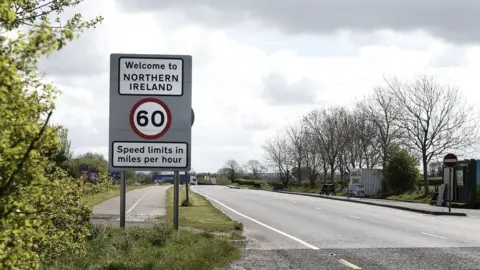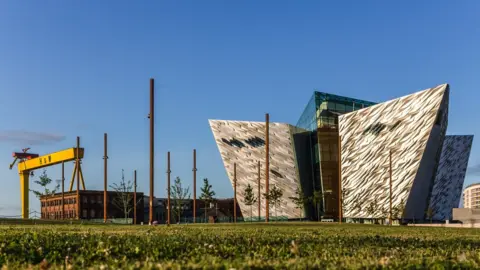Brexit: Tourism 'needs a seamless Irish border'
 Getty Images
Getty ImagesThe chief executive of the Northern Ireland Tourism Alliance has said the sector needs a seamless border to ensure the free flow of visitors.
Joanne Stuart said the industry had grown despite the lack of devolved government, but Brexit posed potential challenges.
There is disagreement over how a so-called hard border can be avoided after the UK leaves the EU.
Ms Stuart told BBC Radio Ulster's Inside Business programme it was vital.
"I think everyone has concerns about Brexit, because of the uncertainty and we don't know how it is going to look," she said.
"Particularly in tourism, when you look at the number of people, visitors, coming in via Dublin and then travelling up to Northern Ireland.
"We need to make sure that that is as seamless as possible, because visitors don't see the border.
"A lot of visitors just look at us as Ireland, and we don't want to cause any difficulties in people coming up to Northern Ireland.
"What we want to do is get those visitors to spend more time in Northern Ireland."
 Titanic Belfast
Titanic BelfastA number of business organisations have raised concerns that a hard border in Ireland would have a negative impact on the free flow of goods, services and people north and south.
However, some Brexit supporters say the issue can be resolved through the use of monitoring technology.
The UK and EU would like to keep the border frictionless through a comprehensive trade deal.
Ms Stuart said there were other challenges for the tourism sector in Northern Ireland.
"Skills is another challenge, which although related to Brexit, is a separate policy around immigration," she said.
"Certainly in tourism and hospitality, we would have over 20% reliance on people wanting to work in the industry outside of Northern Ireland."
The tourism industry is so resilient. What we've been through, and having no focus on tourism since the last Executive, and yet tourism has grown 35% in the last five years, and the industry has an ambition to double that in the next 10 years."
Inside Business is broadcast on BBC Radio Ulster on Sundays at 1330 BST and on Mondays at 1830 BST. Listen to the podcast here.
